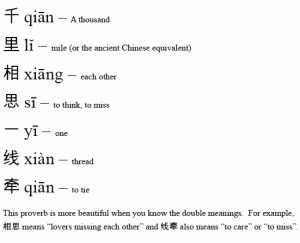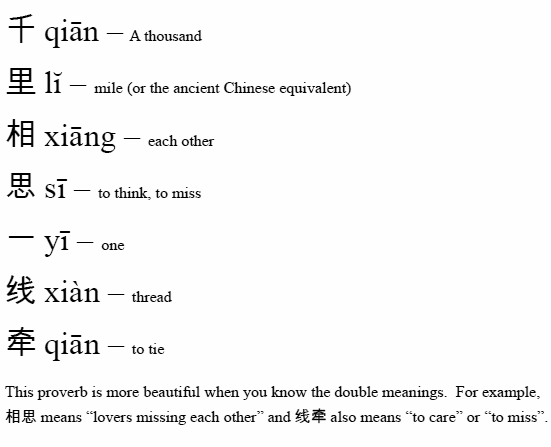Origin of ancient Chinese sayings:
China is said to have more proverbs than anywhere else on Earth. The origins of some are lost in the mists of time. Others appear to be related to comments by Confucius and other ancient sages. Some also appear elsewhere, such as in the form of Zen Ancient Chinese Saying extant in Japan. Most of those below are in the rendering of Chinese Proverbs from Olden Times, Peter Pauper Press, Mt. Vernon, N.Y. , 1956.

Those marked with stars are proverbs that appear in the above book, but the form given here is my own rendering or a rendering or translation that I have come across elsewhere.
–Victor Daniels, 5-23-05
Ancient Chinese proverbs and four-plus character idioms are developed from the formulaic or social dialect/saying/expression (歇後語 in pinyin: xièhòuyŭ) and historical story in Chinese.
Some proverbs are literary; that is, from a written source. (See the historical written language or the more modern written language.) Others originated among families, street vendors, and other commoners–all walks of life.
Some famous ancient Chinese saying is:
1.Literally: A drop of water shall be returned with a burst of spring.
2.Meaning: Even if it was just a little help from others, you should return the favor with all you can when others are in need.
3.Literally: A single day of sub-zero temperature is not enough to create three feet of ice.
4.Moral: Great things cannot be accomplished in a short period of time.
5.Literally: If the wind comes from an empty cave, it’s not without a reason.
6.Meaning: Things don’t happen for no reason; everything has a cause.
7.Literally: The old horse in the stable still yearns to run 1000 miles 1.
8.Moral: Everybody, no matter the inexperience, yearns to achieve great deeds. Another one is “The older the ginger the hotter the spice”.
9.Literally: Over a long distance, you learn about the strength of your horse; over a long period of time, you get to know what’s in a person’s heart.
10.Moral: Character can be revealed by time.
11.Literally: To hit a dog with a meat-bun.
12.Interpretation: Punishment gives less incentive than a reward.
13.Moral: Don’t use the wrong method to approach a problem.
14.Literally: You must persevere to accomplish seemingly impossible tasks.
15.Moral: Everything can be done with enough perseverance.
16.Compare: Where there’s a will, there’s a way.
17.Literally: When the tree falls, the monkeys scatter.
18.Usage: When a leader loses power, his followers become disorganized. This proverb is often used to describe fair-weather friends.
19.Literally: Try to save the dead horse as if it is still alive
20.Meaning: Do the impossible, for it may truly be possible.
21.Literally: See the wind, turn the rudder
22.Meaning: Has no self – personality so they follow the most powerful one
23.Literally: Wealth does not pass three generations.
24.Meaning: It’s rare that the wealth of a family can last for three generations (the 2nd may see the value of hard work, but the 3rd forgets it).
25.Explanation: In business, the first generation works extremely hard, so that the second generation reaps the benefits. By the time the third generation arrives, the wealth is squandered.
26.Literally: Thirty years the east bank, thirty years the west bank.
27.Meaning: One’s luck and one’s destiny will change over time.
28.Literally: Luck will change in 10 years.
29.Meaning: Luck will turn around every ten years.
30.Literally: If you’re poor, change and you’ll succeed.
31.Meaning: When out of means, seek change. Then opportunities will come.
32.Literally: One mouse dropping ruins the whole pot of rice porridge.
33.Equivalent English saying (Ancient Chinese Saying): One bad apple can spoil the whole bunch.
34.Literally: Careful with others is a must have.
35.Meaning: Be cautious of people that may hurt you intentionally.
